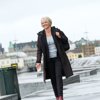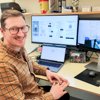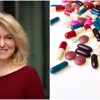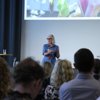Fritextsökning
Artiklar per år
Innehållstyper
-

From pharmacist to life science podcaster – Magnus Lejelöv uses his voice as a tool
Magnus Lejelöv has more than 20 years of experience in the pharmaceutical industry and has conducted nearly two hundred interviews with healthcare professionals on his podcasts.
-

An organ seldom in the spotlight – but utterly vital
The kidneys consist of more than 40 types of cells and have more functions in the body than most people know. Julie Williams leads AstraZeneca’s work in preclinical research about kidney diseases. “They are probably one of the most complicated organs in the body, and I like a challenge”, she says.
-

Aqilion's licensing journey: From Merck partnership to new opportunities
Be extremely meticulous with your scientific data, but spend just as much time and effort on business development. That piece of advice comes from Aqilion's CEO Sarah Fredriksson and is directed at biotech companies aiming to find a good licensing
-

Career coach on salaries: “There is no right or wrong”
What is a reasonable salary for my job? It's a question we all ask ourselves. But how important is a higher salary really? Career coach Tina Persson believes this is an important consideration.
-

A tiny animal with great importance
From the mythical Ganges River to the less sacred, but considerably cleaner waters in KI's aquariums in Solna. The little zebrafish has made an unconscious career – as an increasingly important model organism in medical research.
-

Who pays for Rebecca Doe – and all of us?
Anna Törner on how easily we get used to the idea that healthcare is free - when it really is about how and who pays for it
-

AI detects tumor disease – via voice recording
A short voice recording along with facial images – both analyzed with an AI algorithm – can make it possible to detect the rare tumour disease acromegaly and initiate treatment at an early stage.
-

Anna Törner: Vem betalar för Rebecca Doe – och alla oss andra?
Det lätt att vänja sig vid tanken att vård och läkemedel är gratis, när det egentligen handlar om hur och vem som betalar. Det skriver Anna Törner i en krönika.
-

We desire talent to come here, but are we genuinely welcoming them?
Sweden faces significant challenges in creating a truly inclusive environment that makes international professionals feel welcome, valued, and able to build meaningful careers, writes Sarah Lidé in a column.
-

Digitala tvillingar blir verklighet i primärvården – ”Som en tamagotchi”
Att möta sin egen digitala tvilling och se vad som händer med kroppen om man slutar röka eller ändrar diet? Det ska testas vid besök på vårdcentraler i Östergötland.
-

The business coach: “We need to learn from our mistakes”
The past year has been challenging for many biotech companies, with several comapanies facing financial stress and bankruptcy. To understand how entrepreneurs can navigate these tough times, Life Science Sweden spoke to Pia Keyser, a business coach at Umeå Biotech Incubator, who has worked with many companies in the industry.
-

Astra Zeneca lägger ut miljonbelopp i Ryssland – ”Varken acceptabelt eller försvarligt”
Svensk-brittiska Astra Zeneca har spenderat mångmiljonbelopp i Ryssland efter krigsutbrottet. Det handlar bland annat om bidrag, donationer, genomföranden av studier och utbetalningar till läkare.
-

AI upptäcker tumörsjukdom – via röstinspelning
En kort röstinspelning tillsammans med ansiktsbilder – i bägge fallen analyserade med en AI-algoritm – kan göra det möjligt att upptäcka den sällsynta tumörsjukdomen akromegali och sätta in behandling i ett tidigt skede.
-

Sensorer som lossnar och buggar i appar – fler klagomål på medicinteknik
Läkemedelsverkets nya e-tjänst för anmälan av problem med medicintekniska produkter har lett till en markant ökning av rapporter från privatpersoner. Särskilt många av anmälningarna gäller produkter för personer med diabetes.
-

Hypothesis testing versus conspiracy theory
"How do you know what is a conspiracy theory and what is a reasonable, scientifically based conclusion?" In a column, Ingrid Lönnstedt reflects on this question.
-

Hård kritik mot journalsystemet Millennium – ”Man har gråtit på jobbet”
Journalsystemet Millennium har införts på Södra Älvsborgs sjukhus i Borås, men kritiken lät inte vänta på sig. Nu inleder Läkemedelsverket en tillsyn av systemet.
-

Drug development booms in Medicon Valley
When it comes to developing new medicines, the Öresund region is one of the top performers in the EU. Companies working on commission for pharmaceutical companies are highlighted as a success factor. “Everyone has heard of Novo Nordisk, but these companies are unknown to people outside the industry despite being the golden vein of the life science sector,” says Anette Steenberg, CEO of the cluster organisation MVA.
-

”The importance of stratification in a statistician’s August kitchen”
Ingrid Lönnstedt writes about an experiment of her own at home and about what lessons can be learned from it, in a science column.
-

A new life science cluster formed – “We are very strong in talent”
Stockholm and Uppsala’s joint life science cluster aims to be among the best in Europe. Pontus Holm, Life Science Coordinator for Region Stockholm, says the decision to create a joint profile for the two cities is strongly supported. He mentions that around 50 stakeholders were asked last winter if they were in favour of a joint cluster and that “the answer was a resounding yes”.
-

FN antar ny deklaration om antibiotikaresistens
En ny deklaration gällande arbetet med att motverka antibiotikaresistens ska i dag antas vid FN:s generalförsamling.
-

Moderna fälls efter 20 000-kronorserbjudande till barn
Moderna kritiseras i Storbritannien för ett felaktigt meddelande där barn erbjöds 1 500 pund, motsvarande över 20 000 kronor, för deltagande i en klinisk studie av bolagets covid-vaccin.
-

“We should avoid surgery if we can”
Since February this year, she has been Scientific Director Life Science at the Karolinska Institutet. Life Science Sweden met Anna Martling for a talk about role models, surgery and Sweden’s strengths and weaknesses in medical research.
-

Ingrid Lönnstedt: ”The confidence interval and its width”
Always keep an eye on the width of your and others’ confidence intervals, writes Ingrid Lönnstedt in a science column.
-

Artificial intelligence in radiology – “Risk prediction is very exciting”
A growing number of solutions based on artificial intelligence are being developed and used in healthcare. According to Sophia Zackrisson, Professor of Radiology at Lund University, radiology is a field that is well suited to the technology.